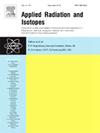中子谱展开算法的停止标准
IF 1.6
3区 工程技术
Q3 CHEMISTRY, INORGANIC & NUCLEAR
引用次数: 0
摘要
中子谱展开是辐射防护和剂量测定中的一个关键过程。使用迭代算法的展开代码需要一个停止迭代的标准。一种方法通常依赖均方根误差(RMSE)标准来评估迭代算法的收敛性。这项工作的目的是提出一种新的标准:平均比率缩放(AVGS)和平均比率缩放相对变化(dAVGS),以解决与 RMSE 相关的具体挑战。我们进行了广泛的验证测试,涵盖了一系列情况,结果表明展开光谱与参考光谱之间具有很高的一致性。本文章由计算机程序翻译,如有差异,请以英文原文为准。
Stopping criteria for neutron spectrum unfolding algorithms
Neutron spectrum unfolding is a crucial process in radiation protection and dosimetry. Unfolding codes using iterative algorithms require a criterion to stop the iterations. One approach often relies on the Root Mean Square Error (RMSE) criterion to assess the convergence of iterative algorithms. The aim of this work is to present a new criteria: Average Ratio Scaled (AVGS) and Relative Change in AVGS (dAVGS) to address specific challenges associated with RMSE. Extensive validation tests were conducted, covering a range of scenarios with results showing high level of agreement between the unfolded spectra and the reference.
求助全文
通过发布文献求助,成功后即可免费获取论文全文。
去求助
来源期刊

Applied Radiation and Isotopes
工程技术-核科学技术
CiteScore
3.00
自引率
12.50%
发文量
406
审稿时长
13.5 months
期刊介绍:
Applied Radiation and Isotopes provides a high quality medium for the publication of substantial, original and scientific and technological papers on the development and peaceful application of nuclear, radiation and radionuclide techniques in chemistry, physics, biochemistry, biology, medicine, security, engineering and in the earth, planetary and environmental sciences, all including dosimetry. Nuclear techniques are defined in the broadest sense and both experimental and theoretical papers are welcome. They include the development and use of α- and β-particles, X-rays and γ-rays, neutrons and other nuclear particles and radiations from all sources, including radionuclides, synchrotron sources, cyclotrons and reactors and from the natural environment.
The journal aims to publish papers with significance to an international audience, containing substantial novelty and scientific impact. The Editors reserve the rights to reject, with or without external review, papers that do not meet these criteria.
Papers dealing with radiation processing, i.e., where radiation is used to bring about a biological, chemical or physical change in a material, should be directed to our sister journal Radiation Physics and Chemistry.
 求助内容:
求助内容: 应助结果提醒方式:
应助结果提醒方式:


